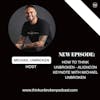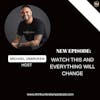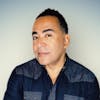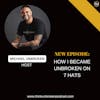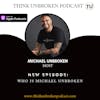How to Let Go of Failure, CPTSD, and Trauma Healing with Tanner Chidester
In this episode, Michael Anthony is joined by Tanner Chidester, founder & CEO of Elite CEOs, to discuss his journey of overcoming failure, Complex Post-Traumatic Stress Disorder (CPTSD), and healing from trauma.
In this insightful conversation, Tanner shares his personal experiences of growing up in a dysfunctional family, facing setbacks and failures, and struggling....
See show notes at: https://www.thinkunbrokenpodcast.com/tanner-chidester-how-to-let-go-of-failure-cptsd-and-trauma-healing-podcast/#show-notes
In this episode, Michael Anthony is joined by Tanner Chidester, founder & CEO of Elite CEOs, to discuss his journey of overcoming failure, Complex Post-Traumatic Stress Disorder (CPTSD), and healing from trauma.
In this insightful conversation, Tanner shares his personal experiences of growing up in a dysfunctional family, facing setbacks and failures, and struggling with the debilitating effects of CPTSD. He also reveals the transformative practices and tools that helped him move beyond his past traumas and find success in his personal and professional life.
Listeners will gain valuable insights into the challenges of trauma recovery, the importance of self-compassion, and the power of perseverance. Tanner's inspiring story serves as a reminder that we can overcome even the most challenging of circumstances, and that healing is possible with the right mindset and resources.
So, if you're looking for a compelling discussion on trauma healing, resilience, and personal growth, tune in to this episode of the Think Unbroken Podcast with Tanner Chidester. Don't miss out on the transformative insights and wisdom that he has to offer.
************* LINKS & RESOURCES *************
Learn how to heal and overcome childhood trauma, narcissistic abuse, ptsd, cptsd, higher ACE scores, anxiety, depression, and mental health issues and illness. Learn tools that therapists, trauma coaches, mindset leaders, neuroscientists, and researchers use to help people heal and recover from mental health problems. Discover real and practical advice and guidance for how to understand and overcome childhood trauma, abuse, and narc abuse mental trauma. Heal your body and mind, stop limiting beliefs, end self-sabotage, and become the HERO of your own story.
Join our FREE COMMUNITY as a member of the Unbroken Nation: https://www.thinkunbrokenacademy.com/share/AEGok414shubQSzq?utm_source=manual
Join us for our FREE trauma Transformation conference this December at: https://unbrokencon.com/
Download the first three chapters of the Award-Winning Book Think Unbroken: Understanding and Overcoming Childhood Trauma: https://book.thinkunbroken.com/
Join the Think Unbroken Trauma Transformation Course: https://coaching.thinkunbroken.com/
@Michael Unbroken: https://www.instagram.com/michaelunbroken/
Follow us on TikTok: https://www.tiktok.com/@michaelunbroken
Learn more at https://www.thinkunbrokenpodcast.com
Learn more about Tanner Chidester at: https://tannerchidester.com/
Support the Podcast: Become a listed sponsor!
Follow me on Instagram @MichaelUnbroken
Learn more about coaching at https://coaching.thinkunbroken.com
Get your FREE copy of my #1 Best-Selling Book Think Unbroken: https://book.thinkunbroken.com/
Michael: Hey! What's up, Unbroken Nation! Hope that you're doing well wherever you are in the world today. I'm very excited to be back with you with another episode with my guest, Tanner Chidester. Tanner, my friend, how are you? What is happening in your world today?
Tanner: Yeah, I'm good man. Thanks for having me, just busy as you know, but excited to be here. So excited for the show.
Michael: Same man. I'm super excited to have you here as I was telling you before we got started, Tanner, I've kind of just silently been watching the way you've been presenting yourself into the world on social media, and I think you and I probably connected on Facebook a year or two ago, whenever that might have been. And you know, man, you're doing something that I think is really beautiful and powerful in the way that you're presenting your truth to the world. We're both entrepreneurs. We both run multiple companies. We both have, oddly enough, and we may get into this, grew up Mormon, and you know, there are certain things about the parallels of experience that lead to down this path in which we find connection with people. But one of the things, I know to be incredibly true about the world is, and especially as men so, I will context that since I cannot speak as another gender. We struggle hard with vulnerability, with truth, with honesty but dude, you've been putting out shit where I'm reading this and I'm thinking to myself, there is something really powerful in this dude's message. And so, where I kind of wanna start with you is just there, what has inspired you to be so incredibly vulnerable online with your team and your businesses and in your life right now?
Tanner: Yeah, that's a good question. I'm not sure, I think for me, there's kind of those points in your life where you just remember like, Oh, at that point, that's when this started to happen, I started doing this. I think for me, I kind of got to the top of the mountain, so to speak, and so for me, the top of the mountain was hitting a million dollars in a month. Like I remember that was a goal I set, I hit it under two years. And so, when I got there, I just thought that was it, I was like, man, like obviously there's more to do, but I was like, man, if I could hit this goal, that'll be everything. And I'm still in Miami, but I was in a 5,000 foot, you know, 6 million penthouse and I had and half million-dollar Lamborghini and you know, had all the dates in the world. And I just remember I just was pretty miserable. And it was before that time, I used to just say, when people would say like, money isn't everything, I'd be like, well, yeah, you're just poor, that's what I would tell myself. I wouldn't say it out loud, but that's what I'd tell myself. And so, I don't know, I just think like I learned that, you know, being happy is like, I think living in your truth and just saying what you feel. I think it's hard, especially online, where you always put on a facade or you don't really say what you think and you're always worried about what other people will say. It's just so much easier to just say what you really think and even if people disagree with it or they think bad things of you because they're gonna think 'em anyways, that's the irony. So, I think at times that by not saying certain things, that more people will like us, but there's people who still don't like us anyways and when I kind of realized that, it just made me a little bit more, I guess, open to like sharing my true thoughts and feelings because I was like, well, if they're gonna hate me either way or judge me either way, then doesn't really matter. And also, just being happier, I just think I was so focused on money, so focused on winning that I kind of forgot to live a little bit and I don't know, share light my thoughts and feelings, and I think they can help other people. I think one thing about being successful or financially rich or whatever you want to call it, is, you know, people give you a little more weight to your words and I didn't believe a lot of what people said because I was like, well, you're rich, but you're old or you're poor. And so, I just would not give any weight to what they said and so, I'm sure there's another egotistical guy out there who struggled the way I did, and maybe hearing it from me will help him.
Michael: So, that's powerful, man. And you know, I want to create some context around your story and we'll go wherever you feel like going today, but people will hear what you said, you're like, I made a million dollars a month and immediately they're gonna go, fuck that guy. But you know what they probably don't know about you is growing up in a large household, with a dad who was a teacher, you know, finding your dreams crushed on the football team through hurting your shoulder like that thing called life. And you know, I think people see where we're at today often, and they just go, Man, those guys don't know struggle, they don't know what it's like to hurt, they don't know what it's like this. And you posted on YouTube, this video talking about wanting to take your life, and I remember sitting there watching that and just thinking to myself, Man, there's so much bravery in that because what you're doing is you're talking about the biggest thing I would argue one of the biggest things that people don't talk about that is an alignment with success. And you and I probably can count dozens of entrepreneurial friends and counterparts who have taken their life over the years because you do find, like success is not what you think it's gonna be like it's just not. And so, I would love for you to kind of talk about your story, your background, and kind of how you've gotten to where you are today.
Tanner: Sure dude, love too. And if I go too long, just cut me off redirect me. So, that's actually cool, I didn't know you grew up LDS. I grew up LDS too, pretty religious household. My dad, you know, he was a bishop, state president, you'll know that lingo, but for people who don't know, it's kinda like a preacher just thinking everything I'm saying equivalent a preacher and so pretty religious. I had two older sisters and then I had two younger brothers, two younger sisters. I grew up kind of, I would say I was sheltered is a very good way to say it. And so, I was kind of weird from the outside role’s standpoint where they're like, this guy doesn't know what a cuss word is like, he's never hung out with girls. So, I got made fun of a lot as a kid and specifically about being Mormon, and I'm not sure why that was, but when I moved to Texas, I don't know kids are kids, you know, they'll just make fun of you for anything. And so around, I think I was going into I was sixth grade is where I kind of started realizing people were making fun of me like I became aware I was the class clown, or not the class clown, I was the class, like, joke and that really hurt like I didn't realize that. And when I did, I started working out to beat the kids up that's what I told my parents. And so that was a big shift for me because I was 12 years old, I started going to the gym at 5:30 in the morning then they dropped my sisters off at a Bible study, you'll know what it is, like early morning seminary, right? And then I go to school and three months later I was jacked, you know, because I was maturing and no one else was lifting weights. And then people started mess, stopped messing with me, and I was like, all right, so I take action, I get results this is pretty nice. And that gave me a ton of confidence to basically, I went from like one of the worst players on the football team to one of the best, I went from like getting no girls, getting all the girls. I went from like, Okay, grace to straight A student and I was like, Man, this shit is like, this is it like I figured it out. And so, I became very driven and when I saw sports my whole life became about sports because I started, you know, gaining clout you know, I was in Texas; Texas football is keen and I started gaining a lot of recognition, I was like, hey, this feels pretty good, it feels a lot better than what happened before. And my whole mission in life was like to play in the NFL. So, I became one of three sophomores to make the varsity team which was like, you know, a huge deal, at least in Texas, that was my life. Like I trained from when I was 14, I trained nine hours a day. I trained three hours of basketball, three hours of running in sprints and three hours of weights the whole summer, just so I could make the team. And I kind of did that all the way until I was about 22 so, I gotta play little division one football had a ton of injuries. Don't think I was good enough either, but I played with multiple first round picks. So, when I was done, I knew like I'd done everything I could do so that was a good feeling. But then I became kind of depressed because, I was like, Man, this is the rest of my life, this looks terrible. Like I was an engineer and I had about a year left and I had a mentor who convinced me to drop outta school and his name's David Fry. And I was doing modeling, I was like a server and I was going to school and he's like, Dude, like you wanna make a lot of money, is that your goal? I was like, yeah, you know, because I couldn't play in the NFL anymore. And so, he is like, all right, well, you know, drop outta school and I'll show you everything I know. And I was like, Are you serious? I didn't know anything about business. I didn't even understand how business worked, and so I drop outta school. My girlfriend at the time, I don't know if this was part of why she broke up with me, but she broke up with me, I think that was part of it. Her mom thought I was stupid. My family thought I was stupid. I thought I was stupid. He just did. And so, for 23, about 25, that's kind of when football ended, I learned everything I could from him about digital marketing. I didn't make any money. He really knew the low-ticket stuff, but I didn't have any money to really like run ads or make it successful. But I learned everything on the back end, which was super helpful. Around 25, I'm starting to kind of feel like a loser, more of a loser. So, I move up to Utah and I start doing door to door sales for a company called order, and I did that for about seven or eight months. So that was probably the most pivotal point of my life because I learned how to sell lights out. I mean, I really learned how people think and how to talk and psychology. Then around that time I saw an ad on Facebook and it said how to build all online fitness business. And I didn't really even have social media at the time. I mean, I actually, I take that back, I did a little bit when I was doing my modeling and it grew pretty fast, but it was just people who wanted to look at my body, right? Like, if you guys type my name in on Google, you'll see some interesting pictures, you know, I used to have girls that were like, you know, my mom typed your name in, she saw these pictures. And I was like, Oh lord. You know? So, didn't help. But then, I did that, I signed up, I paid, you know, five grand and they taught me about high ticket and I didn't even know what high ticket was and so, I was like, Okay, so just long story short, I'm selling it for 47 sell it for 1500 they're like, yeah. I was like, all right, done. First week I made 10 grand year later I did a million. And then, you know, we're closing out 50 million in sales and we've been in business like a little over four years now, which is nuts. My first year LA did a million, which is even more nuts to me cuz trajectory. But yeah, that's a short version and hopefully that's good for now, you can go into that.
Michael: Yeah, man, it's a wild story because I think that for so many people, and I relate to a lot of what you said growing up, you know, being Mormon, I grew up Mormon in the hood, so a little bit different than how you grew up. But still being exposed to what I thought was people having fun with me as a child and realizing, oh, they're fucking picking, they're bullying me ‘cuz I was also the weird kid. I don't, dude, I literally did not have a soda until I was like 13 years old, you know. And so, it was weird shit like that, that would happen and I would just be like, Oh, these kids don't like me and much like you, I found sports and luckily I grew into, you know, 6 foot, 420 as a kid, I was the weird little chubby kid and everyone picked on me, everyone bullied me. And dude, that carried just so much weight, right? Because I was like, all right, if I'm not playing sports, which eventually went away when I injured my knee wrestling my senior high school, like I thought I was gonna go to junior nationals and eventually D one school destroyed my knee. And I was like, Oh, well that's definitely not gonna happen. Well, and not to mention I had straight Fs, that probably doesn't help either. And so, you know, so much of my identitywas just tied into that. And I don't know about you, but I felt this massive, massive struggle when I had to shift out of me being, I am the guy who does sports, to being like, I'm the guy who doesn't know what the hell I'm doing.
Tanner: Yeah. I mean, dude, I mean, I actually probably should write a book just about the dark side of sports because high school was fun. I hated college, to be honest it was so mercenary like, and I get it, it's a business, but it just felt so like, not fun it felt so job-like. And I guess it kind of is cuz you know, if you're on scholarship and stuff like that. But I mean, there were guys who, like their whole lives were contingent on making the NFL and you know, everyone, all of us think we're going pro all of us, right? But the reality is one person on each team probably is going pro on average, right? And so, you know, when these guys put their whole lives on it and they're doing like, you know, I remember some of the stars on our team doing remedial math and I mean like fifth grade math dude, like, and I was like, how are you even allowed to do it? But so the coach's job is just to make sure they pass, they do not care it's like pass. And you know, I don't wanna make it sound like every coach out there has bad intentions that's probably not true. But at the end of the day, they're paid to get the players to perform, to win, that's how they get paid. And so, I just would see guys, their lives, when football ended, it was done, they had no good degree, they couldn't get a good job. And they, you know, were not business minded. Right. They skipped class all the time and hung out with the girls. And so, you know, when I was done, it was a blessing in disguise because I had taken care of my other stuff, like I'd always took care of my mind and like tried to be a good student. And so, when it ended, I didn't feel like I had no options, like some of these guys do and it's kind of sad to see because college football or basketball or whatever, they make it seem very glamorous, which it is if you're that guy. But for everyone who's not that guy, it's not, it is the exact opposite and when it ends, dude, it's like your entire identity is gone, because that's all I did for 10 years. I just trained and worked out and trained, and trained and trained, and my whole identity was wrapped up and how good I was at football and how jacked I was. And when that ended, it's hard because everyone's like, oh, you're not cool anymore, you're back to being a loser and that was hard for me. So, I could totally relate to what you just said, a hundred percent.
Michael: Was there like a reset for you? So, I found myself at basically 18 and a half years old being like, all right, I'm definitely not getting into college, my knee's destroyed, so I can't get into the military. I can't wrestle anymore, and so I'm just gonna go figure out how to make money. And that's what I did and then my identity became wrapped in money and ultimately, luckily due to a rock bottom or unlucky, depending on which side of the coin I wanna look at particular day, it was kind of like looking at my life and going here I am 26 years old. I've literally wasted a million dollars. I have nothing to show for it, morbidly obese, smoking two packs a day, drink the whole nine, right? It's life's about as bad as it could get. And I realized something really, really important. And that was that a lot of the things that I was doing and like attaching my identity too actually didn't matter. Like working for a Fortune 10 company didn't matter, working building businesses, it didn't matter, the thing that mattered was just trying to enjoy my life and I started to wrap my identity around that while going through some healing, right? Going through therapy, coaching, reading, like fucking every book ever made and just trying to figure out who I was. Was there a process for you? Like when you're in this window and I know more in depth of your story from reading your book of just those massive struggles fucking working at Olive Garden, knocking doors, doing that lifestyle like what were you learning if you like, rewind and put your brain into like a decade ago, five years ago, seven years ago, like what were you learning about yourself in those moments of struggle?
Tanner: Yeah, I mean, I think I just learned that I honestly felt like I just had more mental fortitude than most people. I think what I went through like getting to that kind of financial success is that most people are not willing, I think to go through that. I learned a lot about myself but I think also, it's cuz I'm insecure. I mean, the whole reason I wouldn't quit is not because I didn't want to quit, it's because I wouldn't quit because I was so embarrassed if I had to go back and basically let people see that I failed because to that point, I hadn't failed at anything. I mean, even the NFL, yeah, that didn't work out, but I felt like it was a little outside my control based on my injuries like I could not stay healthy. I've gone in college and I did not get to get on the field for a single college down because I was literally always hurt, always. And so, I don't know, I guess in that point, I don't know how you feel about your journey, but I felt, when I started getting into this business, I was like, Man, you know, if I struggled that much and I have this level of mental fortitude, which I think is in the top 1%, I can only imagine how other people feel. And it became apparent to me why a lot of people quit, it became apparent to me why a lot of people aren't successful, not because they're not special, but because they're not willing to push through the pain ‘cuz it sucks, dude. I mean, I just remember I didn't date, I was embarrassed to hang out with girls cuz of my car, I couldn't afford stuff. I mean, Oliver paid me a hundred bucks a day. I would go on a date with a girl and blow the cash on a date. And I was like, Man, I don't wanna do that anymore. I was working 16, 18 hours a day with no results. I mean, I would work half a day and then come home and work dead tired and it wouldn't work. And so, you know, two years doesn't sound long, but when you're working every day of the week, 18 hours a day, and you rarely take breaks, it just feels like the end of the world and it doesn't feel good and yourself esteem's low, people ask you what you're doing, you know, oh, I have a business and they're like, well, you're working at a garden, how's that going? You know, not going great. I don't know if that's the answer you're looking for, but I guess I learned a lot about myself and my mental fortitude and when I finally did hit success, that did a lot for me because I realized, I was like, you know what? Like as long as I don't quit, even if I'm not the smartest person, even if I make mistakes, like I will get there. And I'm lucky I had a mentor who kind of like kept pushing me because I called him four to five times over that two years and I almost quit. And he just would talk me off a ledge and it's crazy cuz I was on a podcast the other day and I said, Dude, you know, the difference in opportunity cost is about 49.6 million dollars because that's what I would've made in my engineering job is about 400 Gs and I've done close to 50 and it's not all about money, that's part of why we're on this show. But, I mean, that kind of stuff's crazy. I think people do that all the time where they make these decisions that they have no idea the lasting impact and they'll never know and that's scary to me.
Michael: I love that. Take the space please because I like, this is what this is about. You know, I think about so often the difference between success and failure in pretty much everything in life is just timeline. You know, a couple years ago, Grant Cardone, who I know that, you know, he invested into Think Unbroken so, he's a business partner, right? And he tells me something really important, dude. He goes, look man, the only time you ever lose is if you quit. And I'll tell you this, building the business like the podcast, obviously this is about value, this is about helping people and changing their lives, but I don't know about you, dude, I've never listened to a podcast that ever changed my life like entirely. I've always had to get the book or go to the coaching session during the seminar, do whatever the next thing was from these people that I look up to that mentor me. And I think that a big part of it is just the willingness that I've discovered that I'm just not gonna quit like, I'm just not going to stop. And I think that a lot of that comes with the resiliency of maybe just the suffering that I endured as a kid like it's hard to grow up Mormon and fucking poor, and biracial. Right. And so, you know, being in that boat made me just go for a long time. And I don't know if you related to this, but for a long time, dude, I just hated people and I was like, I'm gonna go on my own. I'm gonna figure it out. Nobody's gonna help me cuz I don't love or trust anyone. And then I realized like one of the most empirical truths of life is that you have to have mentorship, you have to have community, you have to have coaches and partners and friends and family and love, because without those things, like nothing's gonna be different. Was it because you grew up playing sports that you went and found a coach or a mentor, or was that just like happenstance? Like how did that evolve for you?
Tanner: I just hit rock bottom. I mean, so, I left college thinking that I could figure everything out and I had a very big ego because to that point, I've done everything on my own, so to speak I mean, I built my body, I got scholarship offers, I had straight A's, like I got the girls. So, I just was like, I can do anything and that's a good mindset to have and I think to a degree I did. But then, you know, two years trying to start my business, having no success, I was like, dude, I just got to a point where, especially knocking doors, I think that's really what pushed me over the edge is I mentally was so tired that was like, dude, I will do anything and I literally would've done anything, like anything. And so, when I saw that ad and it was like how to build an online fitness business, it was just happenstance I saw it, it was like that's the industry I'd been in. And so, I got on the call and I just gave them every dollar I had because I just was like, there's no other choice. Like sometimes, you know, my sales team and probably your sales teams, you know, they're telling us about something's like, yeah, they said it was too. I mean, I just didn't even care. I just was like; I'd rather be homeless than continue to live the way I'm living because I hated and I just felt like a loser. And I think a lot of people are successful, honestly, they have similar stories where it's some type of insecurity or fear driven decision making that just pushes them to like crazy heights and crazy levels where they can just endure massive amounts of pain for short periods of time. And like, I mean, door itself sucks. I mean it was six days a week, 12 hours a day, including the travel and we have one day off and I did that for seven to eight months straight in the Alabama heat. I mean, it was hot, man and it is like the stuff that happened out there, like people pull knives on me, guns. I just think it was all those things. I don't know if I wish I had better answer, but I just think it was that I just hit rock bottom and I was so sick of that crap. I was like, dude, I'll lick a floor if I know it works. And I think most people, they're unwilling to do that like they say they will, but they won't. But I was that guy and I remember my mentor David, he used to rip into me and he even said Tanner and he is like, you know what your best quality is? I was like, well, he is like, I can rip into you and you just don't care. And I was like, maybe it's cuz of sports cuz coaches will just cuss you out but I just didn't care, I had no ego when it came to finally that moment, like I had an ego getting help like, I was like, I don't need help. But when I finally had help, I was like, Dude, I'm an idiot, obviously because I'm not, it's what I thought would work isn't. So, you tell me what to do and I will be your best student. And it was like, that's how it was for me in every program, I was always the best student because I just like implemented like a psycho.
Michael: Yeah, I mean, that's like 99% of it. So, I relate to the knocking doors, man, I did cut co when I was like 18, ‘cause I was just like knocking doors all day, dogs barking at you, people freaking out, old naked ladies hands from the door.
Tanner: Like, I got stories about that like, I can't even share them here. I got bad stories about that.
Michael: Yeah. They're just the most gnarly stuff and just being like, is this what I'm supposed to do? And then, you know, progressing and, you know, eventually landing a job with a Fortune 10 company doing really well in sales, you know, I kind of figured out how to navigate the corporate environment and then what I decided to do without really understanding how poor of a decision it was at the time. I was like, I'm gonna quit this job and I'm just gonna open my own business. Right. And I think that was a - it's the greatest mistake I've ever made. And b - I learned a lot in that because, you know, Tom Bilyeu, one of my mentors, a great human in my life, says something that I think everyone really needs to hold onto and that is that the struggle is guaranteed and the success is not. And so much of this journey really is about the struggle and being able to go through it. And I don't even think just necessarily financially, dude, I've struggled in relationships. I've struggled with my weight. I've struggled with the way I feel about myself when I'm by myself. And the only way I've been able to get through any of that shit is just like, keep going man, just keep going the next level. But it was in getting mentorship and getting coaching and investing in myself, that really changed the game. And I think that you're spot on, dude. Most people would not have made the decision that you made, but like, I've always thought about it like this. I'm like, I'm already at fucking rock bottom what's another two grand? Right? What's another five grand?
Tanner: It is not gonna get any worse. And it drives me up a wall because I just wish there's something you could say sometimes where it's like, Dude, you have nothing to lose in everything to gain, right? Like, you have nothing to lose like you can go back to your bad job that you're on the phone call that you ate, it just drives me nuts. But that's also just like, it pushes me to be better cuz I'm like, you know what? I need to get better at sales, I need to get better at marketing ‘cuz like, if they are saying that, I still can't convince them it's not good enough. But I agree and it sucks because like, they don't know, but we're on the other side, so we're like, Dude, like I was there and you just like, you don't know, but like if you go, like you'll get there and then you'll see how smart of a decision it was.
Michael: So, here's an interesting question then. And this'll be a little bit self-serving, so I apologize Unbroken Nation, but I just need to ask the question. One of the things that I constantly am thinking about, because we do high ticket coaching here for Think Unbroken, because that's what I've done like I've literally invested a quarter million dollars in my own personal development, right? And so, I always remembered all the free courses, I never fucking took all the stuff that was $9, I never did anything with it but when I put five figures on the line, I got really involved. And so do you think is as a mindset shift that we as individuals need to make is understanding that the money that we put in is going to reap an ROI that can't be calculated on as a financial matter?
Tanner: Yeah, a hundred percent. I mean, it's just human nature. Like, you know, we care about what we value and part of how we show what we value is what we pay. I mean, that's why Lamborghini cost that much not necessarily, cuz it's a better car, but it does the same thing, right? It's the same thing with Gucci or prado or Porsche or whatever. So, I like that because what happens is the clients care more, which means they take it more seriously, which means they get better results, which means they like you, which means you like them, which means you get, you know, it's like there's only positives. Anytime I've sold something cheap, we have more problems with the cheap stuff than we ever do with the high stuff. And you know, there's a place for everything and there's not one way just to get to the top. But I think, yeah, I mean it's a mindset shift and like I needed that at the time like I needed that. And that was something my mentor always said is like, I used to like really rag on these coaches that I paid money to and I was like, Man, I was successful in spite of these guys like these guys’ suck. And he is like, Dude, you know what? Like you could say that all you want, but end of the day, like you investing that amount of money got you to take massive action, which got you to where you are. And so, there's always like two sides of the coin but yeah, I think the average individual, they are not willing to sacrifice anything because they fear more of what they're gonna lose than what they have to go through to change and so, they lose and that's as simple as that.
Michael: Yeah, it's devastating, man. I remember when I was like 22, I wouldn't invest $5 on a book like literally I was like, I'm not gonna do that. That's stupid. Why would I read a book? You know what I mean? And then most recently I was with Grant Cardone and I invested more money than I cared to say publicly. And I was just like, I'm gonna listen to everything that the scam guy, I'm gonna take notes, I'm gonna follow up, I'm gonna show up. I'm gonna do the thing because I realized something really important Man, we shortchange ourself when we don't invest in ourself, right? I mean, you know, and especially like you grew up in athletic culture, I did too. And so, it's like, man, I want the Jays, I want the best jerseys like I want all that shit and it's like, well, what does that serve? How does that make my life better? Do you think that it's simply marketing that has convinced us that we should put more of a love and admiration in other people's products than ourselves?
Tanner: Yeah, probably. I mean, social media's tough. I mean, I like, I'm pretty good at, I'm better at it now, but I mean, there's even times where I think social media makes it very easy to like not feel that great about yourself because everyone is showing their highlight reels. And no matter how good your highlight reel is, someone else can one up you or they have more engagement or they have more likes. Like when I started my businesses, I remember I used to respond every single comment, like every single comment on my ads talking shit. Right? I don't do that at all now, but you'll still see hate comments and stuff and like obviously now like I just swipe or delete or my team will delete or block whatever, but you know, like they can still get to you or you can still like wonder like, you know, are they right? Like, are they right about me? Or what they're saying correct or you'll just see like someone else doing better than you and you like, man, like, am I doing enough? Like, am I being as good as I can be? So, I think it's a double-edged sword. I would never change who I am because I think that insecurity of like never being good enough is what drives me to always try to be better, but at the same time, it can cause a lot of, you know, problems because you're always comparing, you're always trying to get more and it's never enough. And so, it's kind of that double edged sword it you kind of have to learn to wield. I think if you wanna be happy and also be extremely successful.
Michael: Yeah, like how do you balance that? Like if on this one hand you're trying to recognize, like, don't let the people of the world impact you negatively, but at the same time you're in this place where you're trying to, you know, figure out your own insecurities, like, like how do you, will that sword? Like what is that balance like for you?
Tanner: I mean, I don't think I always do it very well. I mean, I had a talk with my two brothers yesterday who were both younger than me they both work for me. I think they're both most more emotionally mature than I am, to be quite honest with you and they're both married. And that was a comment they made to me, they’re like, you know, Tanner sometimes, like you don't really have very good emotional maturity. You know, you basically get really mad and say nothing, or you get really mad and say, this is what we're doing or nothing. Right. It's like your way or the highway. And he was giving me examples, he is like, you know, you could do a couple of these things, right or like in the middle. And so, I mean, sometimes, just be honest with you, I don't handle it well and that's part of like I need to become a better person. I need to mature. On the other hand, I think a lot of times, like I stay busy and I don't know if that's if someone would deem that good or bad, but I think when you're really caught up in your goals and your mission, you can't really focus on what others are doing and I think that's obviously helped me because when you're not doing a lot and you have a lot of free time, you know, you're scrolling and as you're scrolling, you're seeing what other people are doing, and then the compare game comes in and like, am I doing enough? Am I good enough? You know, when I'm busy and like I'm really focused on my mission and like helping my clients and like connecting with my friends, I don't notice it as much because I'm focused on my mission. And so, you know, I don't know if the answer, I don't know if I'm trying to get across, like always stay busy so you don't feel anything because that can be a problem too, but I think just focusing on your mission helps because you can't be focused on other stuff when you're focused on yours, but as soon as you're focused on others, you know, it usually means you're not doing like what you need to do, if that makes sense.
Michael: Yeah, totally. And it's easy to get caught up, man. I mean, obviously my background's digital advertising and branding, so I understand this market very well, and it's like these algorithms, they want you trapped, they want you swiping, they want you in the dead scroll. You know, I even took Facebook, social media's not on my phone like if I wanna get on social media, I have to go physically sit down at a damn computer. So, the convenience of it at the gym, the convenience of it in the car at the stoplight I've taken out of my life entirely because I found myself just being like, and I'm pretty young, you're pretty young and I find myself being like, Man, why don't I have what those guys have yet? Right. And then I'm like, those dudes are like 70 years old, dude like, you have fucking time. But was there a massive like mindset shift for you when it came around? When it came to actually making money?
Tanner: Yeah, I mean, I think for me, like I used to see, I don't even know if he knows this I've talked to Billy a few times Billy Jean, I haven't had like a private convo, but I've talked to him a few times, like in groups, public forums, stuff like that like we would talk on, we've had some interaction, but I remember my dad, like, we always just had enough to get by and so I remember growing up just thinking like, hey, I don't really want to live that way, that was the first time that happened. And then I remember when I was struggling, I saw some of Billy Jean's ads and like, you know, more, some people, you know, I've never understood the mentality, but they're just immediately, Oh, what's the scam? What is this? What is that? And just like demeaning things. I just remember looking at him and not in like a disrespectful way, but I just remember going, man, like, what does this dude have the eye on? Like, I have all those things, like I could do what he's doing, you know? And I was like, he can do it, like I can do it and it was like more like its always inspiration for me. And so, those were probably the two biggest things just growing up with not a lot and living paycheck to paycheck or bill to bill. My parents always budgeted and you know, those were some of the fights. And again, I'm not trying to make it sound like I grew up poor, I don't think that's the right term, but I didn't grow up with more than I needed. And I just remember growing up, I was like, I'm gonna grow up, I told my mom I'm gonna grow up so I'd be rich enough so I can buy, you know, meal bread. And I can, you know, like go to restaurants, like just stuff like that, that's not even that big a deal. But I just never wanted to worry about money. And I think when football ended it that was like, okay, now I have to actually focus on money because the NFL's done. So hopefully I answered the question but I think it was kind of those two things. Those were kind of the two pivotal moments that I really remember and it still drives me today. Like I have friends or I see people who are doing great stuff. I don't get the jealousy thing. It's just weird. I've never related to that. I've always just been like, competitive where I'm like, man, like I can do what he's doing, but it's never bothered me. And I think it bothers a lot of people because they're not willing to do what it takes, but I am. And so, I don't go like, I'm just like, Oh, cool like, so whatever he did, I can do it versus I think the average person, they're like, I'm not willing to do what he's doing, so I have to come up with an excuse or a reason or justify why he's doing better than I am. And I don't think that's a great way to live, to be quite honest.
Michael: Yeah, I entirely agree. You know what, and just full transparency, I used to be that guy, right when I was a kid, when I was a teenager, before I actually started making real money, I'd be like, Man, fuck these rich people, who do they think they are? And then you come to find out, like the vast majority, I'm gonna butcher the stat, but I wanna say it's like 68% of millionaires in the United States are first time millionaires who build a business. And so, we look at these people and we judge them, but it's like, you know, these people had to work their faces off. Right. And yeah, sure, there's the 1% I mean, I'll probably never touch that, nor do I really care, it's kind of more so about like, am I showing up every day? Am I leaving living life on my terms? And a lot of this switch for me came through the willingness to step into therapy and just to sit in here and identify these things and be like, oh, I understand how I got to this place causation and correlation. Right. What kind of role has therapy played in your life and in your journey to where you are today?
Tanner: Yeah, that's a great question. So, it's been interesting and again, like just full transparency, like I don't know if I did therapy right, or if I was just not open-minded like, it's kind of funny because my younger brother went to therapy and I would definitely say he's gotten a lot out of it like he got married young, he had kind of an unexpected kid with his wife. And like, I would definitely say he's more mature in some ways than I am now and I'm five years older than him. I went to therapy, I don't know, like I went to therapy and I think, like, I was hoping, like there was gonna be some special answer to my problems, you know? And again, I don't know if I did it wrong or I wasn't open minded, you know, my brothers probably would say I wasn't open minded. But I think it was twofold I think part of it was, it can help, but I think you have to be like open-minded to it. And I think if you're very closed off, you're just kind of wasting your time or if you're looking for a specific answer. I think most therapy, and this is just based on my experience so I could be wrong, is like they're trying to kind of help you come to a conclusion on your own versus like kind of telling you what the solution is. And when I went, I was trying to really figure out the meaning of life, like, why does this stuff matter and things of that nature. Again, I don't know if this is the right answer so I'm just very transparent about my feelings, where I'm at in my life. But that was kind of actually when, right after therapy is when, like a good friend of mine, I didn't know what the word was for it at the time, but I think it's the nihilists mindset, right? Where kind of nothing matters. Which is kind of the other end of the extreme of like maybe religion, right? Where it's like nothing matters at all. So, like you should just do whatever you know you want cuz it doesn't really matter. Right? That actually mindset helped me I think a little bit more just because I think I was just really hard on myself based on what people said, they're like, dude, like all you care about is money. All you do is work like, this and that, it's not all about that, it's about relationships. And I agree, but at the same time I think I was like really judging myself for like, man, why do I work so much? If it doesn't matter, why am I doing this? And it really helped me come to like an understanding that part of who I am is like, I need to have direction, I need to have a goal. And it makes me feel good like I feel driven when I'm like going after my mission and when I'm not, I feel very like, I don't know, like kind of worthless, for lack of a better word. I mean, it's funny, like you probably had a different experience or like others have, but I don't think I was even open to therapy, so when I went, I left thinking therapy was dumb, to be honest and like now that I've seen my brother go through it and it's worked, I think it's probably always somewhere in the middle, right? We're always like, it's our way, or you know, I'm right, you're wrong. But my guess is it's probably somewhere in the middle where like it can be very helpful, but you have to be open-minded. I don't think, I was open minded at the time and I was going through a lot and I kind of expected the therapist to just, I don't know, give the answer. And when the answer didn't come, I think I just said, this suck, you know, and it doesn't work. And so anyways, hopefully that is a good answer but that's just full transparency like that's kind of what happened so I don't think I took full advantage, if I'm being honest.
Michael: Yeah, that's really interesting to me because, you know, when I was younger, that was certainly my perception of it. I'd sit there and be like, this is fucking pointless. I don't know why I'm here. And then I realized actually, and this is for me, right? And, you know, maybe if it'll serve you or anyone listening, I had this moment, I was sitting in my therapist's office and this rainy Wednesday afternoon, I'd been in there the 400th Wednesday in a row or whatever, you know, it's years of this back and forth. And I look at him and I go, Dude, I don't wanna fucking be here, I'm tired of your face. And literally, that's exactly what I said. And he was like, hey man, I'm gonna tell you something really important. The thing about this life, depression, anxiety, all of it is, and he goes, you can still tend to your garden and be depressed. And I remember sitting there thinking like, wait is, that's like the ultimate solution. Right. To be able to be like, yeah, fucking today life sucks, but I can still put on my shoes or brush my teeth or go to the gym or, you know, be a great dad or husband or business owner or whatever. And look, I don't think there's a fucking right or wrong way to any of this, man. We all have a different path, but I relate a lot to what you said your friend told you, I'm gonna guess it's the same friend that I'm thinking of and a lot of people beat him up for saying that, and he gets a lot of push backs on this idea that maybe it doesn't matter. And you said something in regard to that on a parallel, and you're like, look the only thing that matters to me is being a good person, and I think that's admirable. I think it's really powerful. If everything doesn't matter, why does being a good person matter to you?
Tanner: I mean, that's a good question. I mean, so again, going back to growing up LDS and like, you know, I love my parents and like sometimes when I'm on podcasts, I hope if they were to listen, they don't feel in any way I'm disrespecting what they believe or how I was raised, but, you know, growing up LDS, it was very much like, these are the things you need to do, this is what's important, this is what's life's about. And I don't know, like there came a point in my life where I just was like, it's hard for me to fake how I feel or who I am and that's good and bad in certain instances, right? But I just remember like when the mission trip came up, you know, cuz the guys go on a mission I would meet kids who would go, they didn't want to go or they would not take it seriously. I was like, why would you go spend two years of your life for nothing? Cause like you don't even want to go. You're just going to please your parents. And so, I think like that was kind of when I started realizing like, you know, I need to do things that like, are in alignment with me ‘cuz I don't know. I just felt like at the end of the day, even if that's right, like there's a South Park episode, I used to joke about my parents were, you know, like, which religion was true and they're like, the Mormons. Right. You know, and I always said joke about that with my parents, but like, let's say that's true, right the way I was raised, like that is the only path, like I think even if that's true, like if I'm faking it, it's just not like a good feeling. And I don't think God or any deedee or whoever you like worship is like what they know, like they know. And I used to see people just like kind of half a religion where they say one thing but they're doing another. And I'm like, like, why don't you just not do it? Like it just seems weird. And so, going back to being a good person, I just think like, I think like even if nothing matters or like even. Like, you know, in a thousand years no one remembers us or whatever, I just think at the end of the day, like there's no reason why you can't be a good person or treat people right. And I think happiness really does come from other people and relationships. So, if you're not doing that, how can you possibly be happy? And I learned that from myself because like, yes, push. I think now, like I enjoy business because of the push, not because of the money. The money is a score board but I don't need the money. And so yes, I like the push, but when it's all said and done, the business won't matter. And I think most people do agree with that. And so, then all you're left with is other people in relationships and so, if you treat other people like dirt, it is just like, aren't you missing the point whether you believe in a second life or you don't, or whatever. And so I think that's what it was for me is like just as a kid, I would see people, and it's not just that religion, right? And you see people do it all the time, but I just see people not living like in their truth. And by truth I just mean like, if you really believe it, do it. If you don't, don't, you know. But don't; don't like, it's such a weird way to live where you're just living for other people and not living for yourself. And so, hopefully that answered the question. But that's kind of how that mindset started and why, where I came to that realization, I guess.
Michael: Yeah, that makes a ton of sense to me. One of the things I always teach my clients, and anyone who really listens to the show is that the greatest sense of self, the greatest sense of healing in this journey is when you do what you want to do because you want to do it and when you don't do things that you don't want to do because you're placating other people, because you're bending yourself to make other people satisfied. I mean, I'm in total agreement with that, and that's a really hard thing to get to because people will be like, well, I'm in this relationship so I have to stay in it. I'm in this job, so I have to stay in it. I'm in this religion, so I have to stay in it. And the truth is you don't, but it's the facing the fear, I guess it's in the same guys. It's like are you gonna invest in yourself? Are you going to go for your dreams? Are you going to change the way you think about yourself in regard to friends and family and relationships? What is something different about you today than in relationships specifically, and that could be in intimate relationships, your family, your community. What's different for you today that you really appreciate about yourself in relationships than maybe five years ago?
Tanner: I just think there's more of an effort to understand people because it's ironic. I think we all do this is like what we hate in others is what we usually hate in ourselves. And I had a great tendency to like, make perceptions about people I either didn't know or about their situations, and then I remember like one of my friends even said, he is like, Bro, like, it's so funny, but like you literally talk shit about people about this thing and you do the same stuff. He's like, you do the same thing and like he even said I'm not sure what caused it as a kid. I don't know, maybe something happen I don't know, but I don't look too deep into it sometimes. But he was like, Dude, you almost treat people so bad that they leave, but then like if they leave, you say they're not loyal. He's like, it's weird, like you do stuff that like makes people not want to be around you, but then you're like, see like you're not loyal. And I'm like very big on loyalty and it was funny ‘cuz I was I think that he's got a point. And so, I think just the thing for me is like I've learned and been more open minded to the things I struggle with, and I'm more open to people and I try not to judge because like until, like knowing someone on social media, knowing them in person, it's not the same, it's just not the same or you'll see like, you know, Grant Cardone, like I could go type his name in on YouTube and I'll have 10 videos that hate him and 10 that love him, and it's like, end of the day it's like have you guys ever met him? Do you even know him? And like, I've just really found that more times than not, it's happened. But more times than not, once I meet someone in person, I understand them better, I like them more, I'm like, Dude, I totally misjudged you. And so, I think that's the one thing I've done better in my relationships is like I try to give people the benefit of the doubt, even if they upset me, because like we've all made mistakes and it's like you know, we want people to give us the benefit of the doubt, but then I wouldn't do it. So at least for me, I think that's the thing I've really tried to improve on is like give people the benefit of the doubt, especially if I haven't met them, because I used to just be very harsh and severe with people. And I would do things like my friend said, I mean, I won't go into details, but I would just do stuff that like, the worst thing in the world, but it was just why would you do that? And then I literally like, when people would like say things like, Dude, like X, Y, and Z is like, you're not loyal dude. You're not loyal. Like if you would ride with me, you'd ride through, you know and it was weird, right? And so, anyways, hopefully that answered the question. But I think it was that like just I've gotten better at like giving people more grace try not to judge and just put myself in their shoes ‘cuz usually once you hear the full story of whatever it is you heard through the grapevine, you're like it makes more sense instead of just like, they're that bad person, they did this, they did that like I don't know and that's probably just insecurity that like helps drive that fear-based decision making that helps make you successful where you paint someone as the enemy ‘cuz it's like easier to hate than it is to like love, I guess. I don't know.
Michael: Yeah, dude, I totally recognize that in myself even to this day. And it's like, you know, there's always this period of like stepping back and pausing and just going, wait a second, why are you having that emotional response to this human being who 99% of the time I don't know them, right? It's kind of like I look at them and I go, Okay, cool. Yeah, I'm gonna make a snap judgment at you. And what I discovered about myself in that was a survival mechanism because when I was a kid, I had to make fucking snap judgments about people immediately to know if I were safe or not. Right? And I think that's a big part of life is you figure out this stuff as you go and the further and deeper that you go in trying to be truthful and honest with yourself, the more that you're able to address and acknowledge these things. And so, it's amazing that you're looking at this from a different perspective and a new scope. Tanner, my friend, this conversation's been incredible and I certainly appreciate your vulnerability and your honesty. You know, I feel very relatable to a lot of the things that you've said today, before I ask you my last question, can you tell everybody where they can find you?
Tanner: Sure. Yeah. I mean social media is always the easiest @tanner.chidester is my Instagram, not a lot of people have my last name, so should be able to find it. And then main websites, like tannerchidester.com, you know, and those are usually two main places people can connect.
Michael: Brilliant. And of course, we'll put the links in the show notes for the audience. My last question for you, my friend, what does it mean to you to be unbroken?
Tanner: Such a good question. I think to me, to what it means to me to think unbroken it sounds cliche, but just to never give up no matter what you're going through because I've been there, you know, a few times like, I seriously consider taking my life last year and it may seem silly to some people and I used to think that too where I'd be like, Dude, like your life's good, bro. Like, shut up your life's good. But we all have our own struggles, but everything that's been worthwhile in my life has been on the other side of hard work. And so, when you're like at your lowest, you're at the bottom that's what makes the come up or hitting the mountain top like that's what gives it meaning. And so without, you know, lows, there can be no highs and so just thinking unbroken to me is just pushing through no matter what and understanding there's gonna be a reward on the other side.
Michael: Yeah. I love that brother, and I appreciate that. Thank you so much, thank you for being here.
Unbroken Nation. Thank you for listening.
Please like, subscribe, comment, share.
Tell a friend.
And Until Next Time.
My friends, Be Unbroken.
I'll see you.
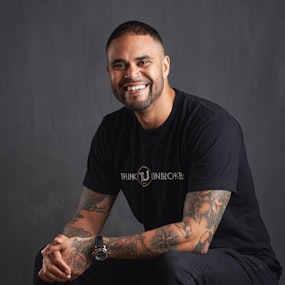
Michael Unbroken
Coach
Michael is an entrepreneur, best-selling author, speaker, coach, and advocate for adult survivors of childhood trauma.

Tanner Chidester
Founder & CEO
Founder & CEO of Elite CEOs, Tanner Chidester has generated over eight figures in the online coaching world. After discovering powerful, repeatable strategies, (which he used to create his first million from a B2C model), Tanner's success went on to disrupt the fitness coaching industry forever. Upon request, Tanner began business coaching others on these same strategies, and paving the way for simplicity in a traditionally complex online arena. Since then the sky has been the limit, especially with his two brothers by his side, who joined the business early on. Tanner's business has organically evolved into the coaching empire we know today: Elite CEOs. With his team by his side, Tanner is now on a mission to turn as many online coaches as possible into millionaires. The Elite CEOs Mastermind, his flagship program, has become a natural hub of six & seven-figure earners. Inside, Tanner and his team provide coaches with the most powerful and proven strategies available to grow and scale any coaching business online.
Welcome to The Think Unbroken Podcast!
Here are some of my favorite recent guests!



























